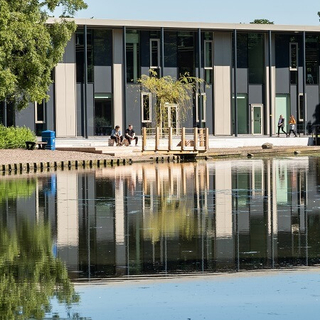MSc Reservoir Evaluation and Management
Skip to section
Key information
- Location
- Edinburgh
- Mode of delivery
- On-campus
- Delivery type
- Full-time
- Start date
- September, January
- Duration
- 1 year
- Qualification
- MSc
Contact
Contact our enquiries team
Contact usOverview
The MSc in Reservoir Evaluation and Management (REM) teaches students how to be successful subsurface geoscientists and engineers, able to build models that can provide good predictions of hydrocarbon reservoir behaviour. The success of these models requires a good understanding of both the geology and engineering of the reservoir. The REM programme, with its combination of geoscience and engineering, provides students with the ability to identify those aspects of the reservoir which have the greatest impact on hydrocarbon recovery. Our graduates typically go on to careers in petroleum geology, geomodelling or reservoir engineering.
Most development decisions in oil companies are based on the predictions of computer models of the subsurface. We teach our students the most effective ways to combine the geology, geophysics and reservoir engineering disciplines in order to develop and run computer models which provide the most robust predictions. The programme has been designed so that graduates are technically well prepared for, and have a sound knowledge of, the reservoir geoscience and engineering aspects of the upstream petroleum industry. The unique combination of geoscience and engineering in the REM programme means that our team projects contain the complete workflow of a field development, from geology to engineering and economics.
Graduates of the REM MSc will be in a unique position of having a thorough understanding of the both the geosciences and engineering issues relevant to hydrocarbon reservoir behaviour. The programme is deliberately intensive, typically consisting of working a full 5 days per week of lectures and practical work, including labs or tutorial exercises designed to teach practical skills in addition to learning theory. The programme includes two field trips to observe geology in the field, both for those with and without prior geological experience.
The most challenging and fulfilling aspect of our programme is the project work, particularly the team project, where students are tasked to propose a development plan for real field. The project integrates all the learning in reservoir geosciences and engineering disciplines and reinforces learning through teamwork.
The programme shares 6 taught courses with MSc Petroleum Engineering and MSc Applied Petroleum Geoscience.
September 2024 entry
The deadline for applications from UK students is 30 August 2024. For EU and overseas applicants, we guarantee to consider applications submitted by 2 August 2024.
Who should apply?
Students on the Reservoir Evaluation and Management programme come from a wide variety of backgrounds, including directly from undergraduate degrees and also from years to even decades of experience in the industry. Our students come to us from all parts of the world; in the last few years the students in all three MSc programmes offered within Geoscience from the Institute of GeoEnergy Engineering have come from over 30 different nations.
Video
Course content
Year 1
The Reservoir Evaluation and Management MSc (REM) is a unique combination of Reservoir Geoscience and Reservoir Engineering. It is composed of three key components that take place over the 1 year duration of the course. The initial part of the course consists of taught courses which are assessed either by examination or a combination of examination and course work (normally 80:20). The taught courses provide 67% of the total marks in the course, with the other 33% coming from a combination of group and individual project work. Between the taught courses and the projects, there is a nine-day field trip to northern Spain, where the different subjects covered in the taught courses are consolidated and integrated.
The three component parts of the MSc are:-
- A set of 8 taught courses, spread out over approximately 8 months. These subjects teach the students the full range of issues from geological concepts to simulation models and aid them in decision-making in reservoir appraisal and development.
- Based on the knowledge gained from the taught parts of the course, students will be formed into groups which mimic a multidisciplinary team in an oil company. The teams are required to produce a full field evaluation and development plan, using data from a real oilfield.
- Students will get the opportunity to work on individual projects around some of the latest research in Oil and Gas, either in industry, with oil companies or service companies, or with academic research groups around some of the latest research in Oil and Gas.
By the end of the course, REM graduates will be able to join an oil company asset team as a productive member and be able to apply their learning from our teaching to real oilfield problems.
Part 1: The taught courses.
The taught course content covers the general workflow for generating a model of the subsurface that can predict the flow of oil from the reservoir into the wells and to the surface. The courses are split between 2 semesters, with a set of exams after each semester.
By the end of the taught course, students will be able to take general geological concepts, understand what is relevant for modelling a hydrocarbon reservoir. They will know how to construct a model of the reservoir, based on available measurements and data from the field, and use the model to assess volumes of hydrocarbons in place and to predict the future production of hydrocarbons from the field.
The courses are ordered below according to this high level generic workflow:-
Reservoir geology
- Reservoir concepts
- Reservoir sedimentology
Reservoir measurements and data
- Rock mechanics, geomechanics and geophysics
- Formation evaluation
- Well testing and production logging
Modelling and forecasting
- Geological modelling and management
- Reservoir engineering
- Reservoir simulation
Please note that, in the course itself, courses may be taught in an order different from that given above.
Reservoir concepts
(mandatory)
Why?
This course teaches students the basics of what geological features are important in oil field geology for different geological environments and how we can encapsulate these features such that they can be extracted from geological outcrops to be included in a computer model.
The aim of this course
The overall aim of this course is to allow the student to:
- Understand how geological features control measurable reservoir properties that impact on production performance.
- Understand the concept of flow units and the basic processes involved in their development.
- Be able to correlate, map and calculate where the hydrocarbons are and how much there is (hydrocarbons in place).
- understand the basics of structural geology and geophysics for assessing reservoir structure and its impact on flow.
Reservoir sedimentology
(mandatory)
Why?
This course teaches students the range of different sedimentary environments that form the primary fabric of reservoirs and how to identify the depositional features that control flow of hydrocarbons through reservoirs deposited in the range of depositional environments.
The aim of this course
The overall aim of this course is to allow the student to:
- Understand the physical and chemical processes responsible for the deposition of clastic and carbonate sediments.
- Understand the primary controls on porosity and permeability and how these may be modified during burial diagenesis.
- Be able to interpret the main depositional environments and to predict the likely reservoir sandbody geometries we might want to model and understand the associated reservoir issues.
Rock mechanics, geomechanics and geophysics
(mandatory)
Why?
This course covers 3 key areas of knowledge important in reservoir studies; the drivers for and measurement of how rocks deform, laboratory testing procedures that provide information around rock/fluid interactions under stress, and geophysical surveying of reservoirs. The result is how to measure key properties of the reservoir at both large and small scales.
The aim of this course
The overall aim of this course is to allow the student to:
Rock mechanics and laboratory tests
- Understand the lab measurements of rock properties under stress.
- Understand the principles of core measurements.
- Understand Pc and Saturation relationships and relative permeability measurement.
- Understand the need for corrections of petrophysical core measurements and the relation of core measurements to logs.
Geomechanics and geomechanical modelling
- Describe and represent the geometric characteristics of reservoirs. Explain development of reservoir shape in terms of deformation processes.
- Understand the impact of deformation on fluid flow, especially the role of faults and fractures.
- Geomechanical approach to understanding flow in deformed rocks.
Reservoir Geophysics (basic principles)
- Influence of rocks and reservoir fluids on seismic properties.
- Seismic Attributes & Seismic Inversion.
- Imaging and Resolution (tuning effects).
- Correlation between Reservoir Characteristics & Attributes.
- Acquisition & Processing (fundamentals, migration).
- 4D Seismic.
Formation evaluation
(mandatory)
Why?
Wireline logs are our only view of the reservoir rocks and fluids via the wells, without extracting the rock from the ground. As such, they are our primary source of information about the distribution of rocks and fluids underground and provide the most high-resolution measurements of our reservoir. We must therefore be able to read and interpret these measurements in order to know what geology is present, where flow is likely to occur and where the hydrocarbons are located.
The aim of this course
The overall aim of this course is to allow the student to:
- Understand the concept of formation evaluation and well logging.
- Understand the physical principles of the tools used in logging.
- Characterise the formation based on interpretation of well logs.
Well testing and production logging
(mandatory)
Why?
Well test and production logging tell us about how our reservoir will flow, the makeup of the reservoir fluid, the producing zones of the reservoir and provides information about the reservoir away from the wells. Well tests provide vital input into the modelling process concerning the position of faults, the distribution of flow and the average flow properties around the well.
The aim of this course
The overall aim of this course is to allow the student to:
- Understand the diffusivity equation and the derivation of analytical solutions related to reservoir features (wells, fractures, aquifers).
- Use the analytical solutions to describe fluid flow in a reservoir.
- Calculate reservoir permeability in simple and complex reservoir geometries.
Modelling and reservoir management
(mandatory)
Why?
This course teaches students how to take all the measured data and geological understanding of the reservoir and integrate these together into a consistent and meaningful model of the spatial distribution of reservoir properties. These properties dictate where oil is stored and where it is likely to flow, so modelling their spatial distribution is essential when deciding the best development strategy (e.g. where to drill a new well). Furthermore, we need to understand how the spatial model can be used in making decisions and how uncertainty in the model properties away from the wells must be considered and quantified.
The aim of this course
The overall aim of this course is to allow the student to:
- Understand the concept and basis of geomodelling (includes geostatistics and equiprobable realisations).
- Understand the workflow in constructing a geomodel.
- Understand the role of integration in geomodelling.
- Understand reservoir management.
- Understand uncertainty in geomodelling and how it is treated.
Reservoir engineering
(mandatory)
Why?
This course teaches students the physics of how the different fluids present in the reservoir interact with each other and the rock. An understanding of fluid flow and drive mechanisms underpins the sub surface flow behaviours that we aim to predict in our simulation models.
The aim of this course
The overall aim of this course is to allow the student to:
- Understand the rock and fluid properties of a hydrocarbon reservoir.
- Describe how the behaviour of the various reservoir fluids changes as the reservoir conditions change.
- Describe the nature of the fluid flow and pressure distribution in a reservoir.
- Understand how production strategies and drive mechanisms (the energy sources that drive production in the reservoir) will impact the recovery of hydrocarbons and hence the calculation of reserves.
Reservoir simulation
(mandatory)
Why?
This course teaches students the principles of simulating fluid flow in the subsurface in 3D computer models of the reservoir. These models are built upon the geological model of static reservoir properties that control flow (see modelling and management) and predict the likely rates and total production from the reservoir for a given development strategy.
The aim of this course
The overall aim of this course is to:
- Develop an understanding of the role of simulation in reservoir engineering.
- Gain insight into the value of simulation.
- Provide the appropriate numerical techniques to enhance hydrocarbon recovery.
Compulsory non-examined courses
In addition to the 8 taught courses, there are also two shorter courses, on Drilling and Production Technology and Petroleum Economics. Each of these, which lasts only 1 or 2 days, is known as a compulsory course component. They are not formally examined, but play an important role in the team project, and so are effectively assessed through that component of the degree course.
Compulsory Course Component A – Drilling and Production Technology
This course teaches the students the concepts around drilling, as drilling engineering and technology are essential to the development of an oil field. Drilling provides the conduits to oil in the subsurface and the data on which to assess and develop the field. It is our only direct route the field. Key parts of the course are:
- Rig Components.
- Measurement while Drilling.
- Reservoir Production Concepts.
- Wellbore Completion Concept.
- Horizontal and Advanced Wells.
Compulsory Course Component B – Petroleum Economics
Beyond evaluating the size and productivity of a reservoir, any decision on whether to develop a field is based on its value. Economics is therefore essential in providing the tools to calculate the value of a reservoir and help to make an informed decision in whether or not to develop an asset. Key parts of the petroleum economics course are:
- To understand the economic concepts involved in project evaluation.
- To understand the value of investments.
- To evaluate risks associated with economic decisions.
- Project Ranking.
Both compulsory parts of the course provide essential skills to allow the students to undertake the Team project.
Project
Part 2: Team Project.
The team project is designed to give our students a realistic experience of life working in a real oil company asset team. The teams are required to use all of the skills developed in the taught part of the course to produce a development plan for a field based on real field data, with all its complexities. From student feedback, this is the most challenging and rewarding part of the MSc and sets our students up for a realistic experience of working in the oil and gas industry.
The Team project has 2 aspects. Firstly a field trip to observe the realistic geology that is present in their field project, then the team project itself.
Field Trip
Following the taught courses and their exams, there is a nine-day field trip to northern Spain in spring. The field trip, to the Southern Pyrenean Basin and Ebro Basin, enables the class to examine rocks deposited in a wide range of environments, including fluvial, shallow marine, deltaic and deep marine. Throughout the trip, the students will work in the teams established for the team Field Evaluation Project which follows our return to the UK. We will consider the rocks seen in the field in terms of their reservoir behaviour, but will also discuss issues related to drilling, well testing, petrophysics, geophysics etc. and integrate the various disciplines studied in the first two semesters.
Examination of rocks at outcrop allows issues of scale, heterogeneity and 3-D geometry to be discussed in a way which is difficult to achieve in the classroom. As part of the trip, the teams will build a numerical model of one of the outcrops studied and will simulate fluid flow through the model (using industry-standard software) in order to gain a better understanding of the modelling issues and potential reservoir behaviour.
Outcrop data will be gathered in the field, some of which might be of use in the team Field Evaluation Project.
Team Field Evaluation Project
The team project aims to simulate a multi-disciplinary appraisal and development project within a petroleum company. The teams are deliberately chosen to have a wide range of backgrounds and experience and will normally include several individuals with oil industry experience. For the chosen field, teams are provided with geological data, including seismic, well logs and core data, in addition to a range of engineering data including well tests, RFT data etc. The aim of the project is to calculate the volume of hydrocarbons in place in the reservoir (STOIIP) and to propose a development plan. Assessment of data quality and uncertainties, as well as the economic aspects, are an important part of the project.
Aims
- Working as an individual but also as part of an integrated team.
- Draw up a work course to achieve the aims of project.
- Provide results in written report form as well as in a presentation to examiners.
Assessment
Written report and oral presentation. Peer assessment within the team and an individual single-well study are also taken into account in the final mark.
Part 3: Individual Project.
Either in industry or within Heriot-Watt, students have the opportunity to undertake an examined research project within the area of Reservoir Geoscience and Engineering. The projects are supervised by members of staff in IPE and can contain any combination of the subjects studied during the taught course or in the team project. Students with industrial experience may bring a project from their own company, but the majority of projects are developed within IPE, following discussion between the student and appropriate staff members.
Aims
The main aim is to carry out an individual research project on a relevant technical problem for a real field or a more cutting edge research focused project.
To do this the students will need to:
- Be self sufficient and make the project their own.
- Undertake a critical appraisal of a problem, followed by devising a strategy to investigate the problem, by research into and around the issue.
- Use appropriate technical resources or perform relevant calculations or experimentation to test their proposed solutions.
- Report their findings in a structured written report and oral presentation. Students are also required to produce a brief paper (suitable for an academic publication), summarising their work.
Assessment
Written report (90%) and oral presentation (10%).
Go Global
Some of our Postgraduate Taught Masters Programmes are eligible for Inter-Campus Transfer. Please contact studywithus@hw.ac.uk for further information.
Fees and funding
Tuition fees
| Status [footnote 1] | Full-time |
|---|---|
| UK | 15112 |
| Overseas [footnote 2] | 29960 |
Additional fee information
All course costs are covered by the tuition fee. This includes full electronic versions of the course notes, core text books, field trips and any day trips arranged as part of the course.
Students should budget additional funds sufficient to cover living expenses such as accommodation, travel to and from the university, food, clothing and leisure pursuits.
Scholarships and bursaries
We aim to encourage well-qualified, ambitious students to study with us and we offer a wide variety of scholarships and bursaries to achieve this. Over £6 million worth of opportunities are available in fee and stipend scholarships, and more than 400 students benefit from this support.
View our full range of postgraduate scholarships.
Entry requirements
Entry
Masters (MSc) level entry applicants must have one of the following:
- Minimum of 2:1 honours degree or equivalent academic qualification in a related subject area.
- For postgraduate conversion courses, non-related degrees will be considered.
- Corporate (or chartered) membership of relevant professional institutions will also be considered
Candidates who do not meet the above entry requirements or have no formal academic qualifications will be considered individually based on their CV and possibly interview. Admission via this route will be at the discretion of the Director of Recruitment.
Recognition of Prior Learning
We are committed to providing study opportunities to applicants who have a wide range of prior experiences through Recognition of Prior Learning (RPL). For more information on RPL, please contact the Admissions Team (studywithus@hw.ac.uk) ahead of application. We can only consider requests for RPL at the time of application to a course of study.
English language requirements
If English is not the applicant's first language a minimum of IELTS 6.5 or equivalent is required with all elements passed at 6.0 or above. Please refer to English language requirements for further details.
Some applicants may be asked for alternative evidence in line with UKVI recognised English speaking countries. Applicants who have previously successfully completed courses delivered in the medium of English language may be considered and will be required to provide documentary evidence of this. Examples would be secondary school education or undergraduate degree. A minimum of at least one year of full time study (or equivalent) in the medium of English language will be required.
All evidence of English language needs to be dated within two years of the commencement of study.
We also offer a range of English language courses to help you meet the English language requirement prior to starting your master's programme:
- 20 weeks English (for IELTS of 5.0 with no skill lower than 4.5)
- 14 weeks English (for IELTS of 5.0 with minimum of 5.0 in writing and no skill lower than 4.5)
- 10 weeks English (for IELTS of 5.5 with no skill lower than 5.0)
- 6 weeks English (for IELTS 5.5 with no skill lower than 5.5)
Why Heriot-Watt?
Clubs and activities
At Heriot-Watt we have an extensive programme of over 90 sports clubs and societies to get involved in. You can try as many as you like or start one of your own!
Edinburgh campus accommodation
Living on our beautiful Edinburgh campus is a great way to meet others from all over the world. Our student accommodation is within easy reach of the teaching buildings, sports facilities, catering venues and the Student Union
Edinburgh Campus facilities
At Heriot-Watt University, we offer a wide range of services to help you deal with all aspects of your life with us, whether these be academic, personal, technical, financial or just plain fun!
Health and wellbeing
Student Wellbeing Services aim to provide a range of support, guidance, activities and advice to help students to be their best, and get the most from their university experience. From counselling to coaching we'll sure you are fully supported.
Heriot-Watt Student Union
There's more to university life than simply getting your degree, and Heriot-Watt University Student Union is all about helping you to have the best possible experience while you study here.
Living in Edinburgh
Historic and beautiful, a cultural capital that fuels the senses whether you love the arts or nature, nightlife or study life, Edinburgh is stimulating and inspirational and never, ever boring.
Sport facilities
Oriam, Scotland Sports Performance Centre offers state-of-the-art sports facilities, for all levels of sport and ability
Your career
Employers around the world actively seek out our graduates because they are work-ready. All our degrees are career-focused and relevant to the needs of industry. Around 95% of our students are in employment or further study within six months of graduating.







